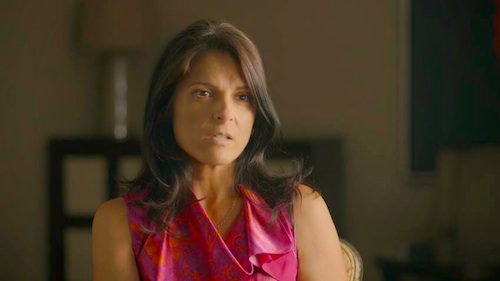By Joe Bendel. In 1998, Greg LeMond was the last American to win the Tour de France. In 2012, LeMond once again became the last American to win the Tour. He had not staged a comeback. The US Anti-Doping Agency had stripped Lance Armstrong of his Yellow Jerseys. Everyone (including Armstrong, to some extent) now concedes the cyclist lied and cheated. However, his former fans will be shocked by the systematic deceit and vindictiveness exposed in Alex Holmes’ Lance Armstrong: Stop at Nothing, which airs on Showtime this Friday.
In a matter of seconds, Holmes conclusively proves Armstrong perjured himself. In a videotaped deposition, he flatly denies taking the illegal performance enhancing drugs (PEDs) he later copped to during his Oprah confessional, while readily acknowledging he was under oath. Holmes then rewinds to chronicle the unvarnished story of Armstrong’s rise and fall. Once, he was a clean and promising talent, but he was already cutting shady deals with competing cyclists—or so they allege with accounts of Panettone tins full of cash.
Ironically, Stop at Nothing implies the first Tour might have been legit, but soon thereafter, Armstrong commenced a professional relationship with Michele Ferrari, a notorious sports physician with a reputation for crossing over the line. We know from Armstrong’s own lips he consumed a whole battery of enhancers. According to teammate Frankie Andreu and his wife Betsy, Armstrong also admitted it to his cancer doctors, in their presence, during the early stages of his treatment. That conversation would become the focus of a pitched legal battle.
Arguably, the heroic protagonist of Stop at Nothing is Betsy Andreu. Alarmed by the obvious risks of PED abuse, Andreu forced her husband to stay largely clear of them, which ultimately cost him his place on the US Postal Service Team. Knowing what they knew, Armstrong and his surrogates did their best to pressure the Andreus into silence, but they stuck to their guns when subpoenaed.
The other heroes of Stop at Nothing are Greg and Kathy LeMond, who were vilified in the media when the former Tour champion diplomatically cautioned colleagues not to lash U.S. Cycling’s wagon so tightly to Armstrong’s star. Former Armstrong Foundation executive director Steve Whisnant explicitly regrets not heeding LeMond’s advice. For his common sense, LeMond was rewarded with canceled endorsements and wild rumors of alcohol and heroin addiction.

At times, Stop at Nothing resembles a gangster movie, where whistleblowers are routinely intimidated and ostracized. Yet, other times, it plays like a spy film, documenting the elaborate means by which Ferrari’s treatments were smuggled to Armstrong’s team. It is all completely gripping and absolutely scandalizing in the tradition of the best true crime books.
There is a general sense that Armstrong started lying to himself as well as the cycling world at large, essentially losing sight of the truth. As problematic as that is, the reality is far worse. The portrait Holmes paints is of a clinical sociopath, who fully understood the implications of his actions and would do anything necessary to maintain his righteous public image. It is not pretty, but it is fascinating. Stop at Nothing is a damning indictment and a grab-you-by-the-lapels watching experience. Recommended for fans of cycling and legal thrillers, Lance Armstrong: Stop at Nothing premieres this Friday (11/7) on Showtime, with multiple airdates to follow.
LFM GRADE: B+
Posted on November 6th, 2014 at 10:27pm.